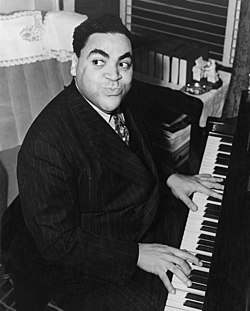Waller's 1943 recording of the song (titled "The Reefer Song" in its eventual release) was a subtle poke at Harry Anslinger, the first head of the Federal Bureau of Narcotics, who had declared marijuana use by swing musicians a menace and had promised to prosecute. [8] During World War II it was harder to get American records pressed, because of a shellac shortage created by the war effort. But in 1943 Armed Forces Radio frequently invited jazz musicians to play for the troops overseas and made "V-Discs" ("Victory Discs") for distribution as a morale booster.
Extended play
The "V-Disc" program began during a musicians strike that was leaving America's biggest stars idle, and the Army leaned on the musicians union to make an exception for the V-Discs, which they did. Lt. George Robert Vincent, a sound engineer then working for the Armed Forces Radio Service, conceived the V-Disc program and convinced the army to put up $1 million for the effort. [9] Due to the shellac shortage, the V-Discs were recorded on a new material, vinylite (a precursor to the vinyl that would become standard in the recording industry), that allowed for narrower grooves. The discs were also pressed at 12 inches rather than 10, the industry standard at the time. These two factors left V-Discs with about six minutes per side (rather than the more typical 3–4 minutes), which gave musicians the ability to record an additional song, or play an extended take, or banter with their unseen audience. [10]
Waller's session
Waller recorded a V-Disc a little over two-weeks after Anslinger vowed to go after pot-smoking musicians (he and others believed that some musicians were deliberately smoking marijuana to obtain "drug addict" deferments to avoid the draft). Waller decided to use the occasion as a way to reflect his puckish contempt for the man. "The reefer cats were aware of their outcast status; in fact, they seemed to relish it. They had created a self-contained culture, and squares like Anslinger were no match," Larry Sloman writes in Reefer madness: the history of marijuana in America. "This brash disdain for the square world's imperatives was nowhere demonstrated more clearly than in the conduct of Fats Waller." [8]
In response to Anslinger's calls for "swing band" arrests Waller decided to record "If You're a Viper," and included an intro that threw only the thinnest of veils over the song's subject. "Hey, cats, it's four o'clock in the mornin'. I just left the V-Disc studio. Here we are in Harlem. Everybody's here but the police, and they'll be here any minute. It's high time, so catch this song," Waller says. "The gumshoes at the Bureau and the Army brass let that one slip right by them, but the guys in the barracks caught the drift, especially those stationed in the Philippines, where the weed was said to be excellent," Sloman writes. [8]
Strong evidence, however, suggests Sloman is wrong that the tune slipped past the censors and it seems likely the recording did not become public until after the war. An article in Goldmine, a magazine for record collectors, says the army did not press the Viper recording for release to the troops. "Ain't Misbehavin'" got pressed, but not "You're A Viper (The Reefer Song)," it says. The article goes on to quote the sound engineer for the session, Ed DiGiannantonio: "We did the session with Fats Waller... When he first got to the studio, he demanded a bottle of VAT-69, which is not hair tonic. And he started playing the piano, and he was okay for a while. Then he consumed the second bottle, and out of the 22 songs, we only used about 8 or 9 of them, because he got very sloppy and started using a few words you shouldn't use." [11] Duty, Honor, Applause, a book about US entertainers during WWII, also strongly implies that Viper did not make the cut. "Jazz legend Fats Waller recorded 22 songs for V-Discs, but only nine were deemed usable. Censors thought the other thirteen "too risque for young GI's ears,' wrote Gregory Spears in a December 23, 1990, article for the Houston Chronicle. "Waller plied himself with a bottle of Vat-69 Scotch during each recording session, and the drunker he got, the more suggestive his songs became. His last recordings... included "The Reefer Song," an ode to marijuana." [12]

